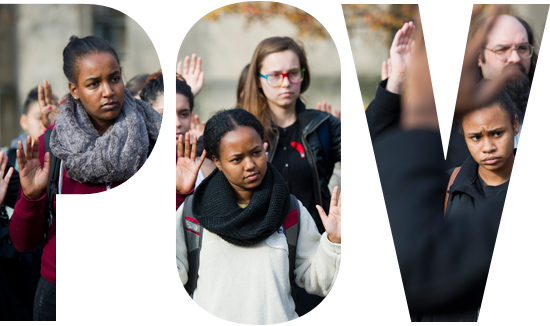POV: We Need to Talk About Race
Recent events demand we all join the public discourse

Photo by Cydney Scott
I have spent several days in crowds, rooms, bars, lunch spaces, and classrooms listening and talking. It’s a way to my personal meditation and reflection on the current news from Staten Island, Cleveland, Ferguson: I know the timing—close of the semester and end of the year—is difficult, but engaging issues of race and the other fundamentals in our society, including power, democratic participation, engagement of youth, and the well-being of communities is never convenient. However, amidst the reports, and whether you feel angered, stunned, surprised at reactions, or even indifferent, take a moment.
At minimum, take measure of yourself. Take time to look at the news. Reflect for a moment on the personal assumptions you hold based upon where you find yourself in the world, right now. For me, my sense of reality on these latest issues—two highly watched determinations by grand juries and the questions about policing in American urban areas—comes as someone who has suffered through the mistreatment of profiling and violence from government authorities. It helps me, on a personal level to take long, reflective pauses by myself and to talk to friends about my feelings. I know I have work to do. Do your thing.
Again, I know the end of any year brings tasks and deadlines, but squeeze in some time for civic thinking. Form your opinion and place your self within a stream of public discussion. Right now, consider joining a demonstration, writing a letter, blogging it out, lobbying, or placing your money and time in an organization or cause that feels right, to you.
I have been in plenty of conversations of late. And, I have simply listened to many more. I notice that we are struggling with personal feelings, loss of affection for our institutions, demoralization, and accepting history. In our conversations we fear bland ignorance, condescension, subjugation, and the myths of color as a way to deal with people we do not know. I notice that we come to the conversations and leave them with the same people. I worry that right now, within this moment’s stress, gaps that we may have had between each other may widen.
I hear those of you who believe the we-are-the-world-let’s hold-hands conversation and political action game is just not for you. If you’re sitting it out until the next plebiscite, or think you are not welcomed in these conversations, I yell, “Stop!” If you go deeper, you’ll find that the current events are not simply about indictments and body cameras, but might be more about societal conditions. We like to think we can have some effect on the world—here’s your chance. I also place a special call to my white sistren and brethren. Too often, when it comes to the racial conversation, you’re hurt, fixated on stats, and looking for a special invitation and a welcome mat as entry to talk. Jump in! This time, the conversation and its results might be about forging a new societal identity. You need to be there, too.
Instead of advice for your conversations, I leave you with a prayer:
I hope our conversations create a collaboration among students, groups of faculty, staff, departments, and the larger Boston community.
May you get into gatherings that are productive, hip, and reach across aisles and engage in conversations that reflect and acknowledge that fears exist—especially when we come together to discuss race. Remove roadblocks to conversation. Rally as people.
May your conversations about race help lessen anxiety and fear among folks whom you do not know.
Peace to you as you struggle to speak in your voice.
You have my word that I will not indict you during your conversations with me.
Time for conscience and courage to meet.
Kenneth Elmore (SED’87) is dean of students at Boston University.
“POV” is an opinion page that provides timely commentaries from students, faculty, and staff on a variety of issues: on-campus, local, state, national, or international. Anyone interested in submitting a piece, which should be about 700 words long, should contact Rich Barlow at barlowr@bu.edu. BU Today reserves the right to reject or edit submissions. The views expressed are solely those of the author and are not intended to represent the views of Boston University.
Comments & Discussion
Boston University moderates comments to facilitate an informed, substantive, civil conversation. Abusive, profane, self-promotional, misleading, incoherent or off-topic comments will be rejected. Moderators are staffed during regular business hours (EST) and can only accept comments written in English. Statistics or facts must include a citation or a link to the citation.